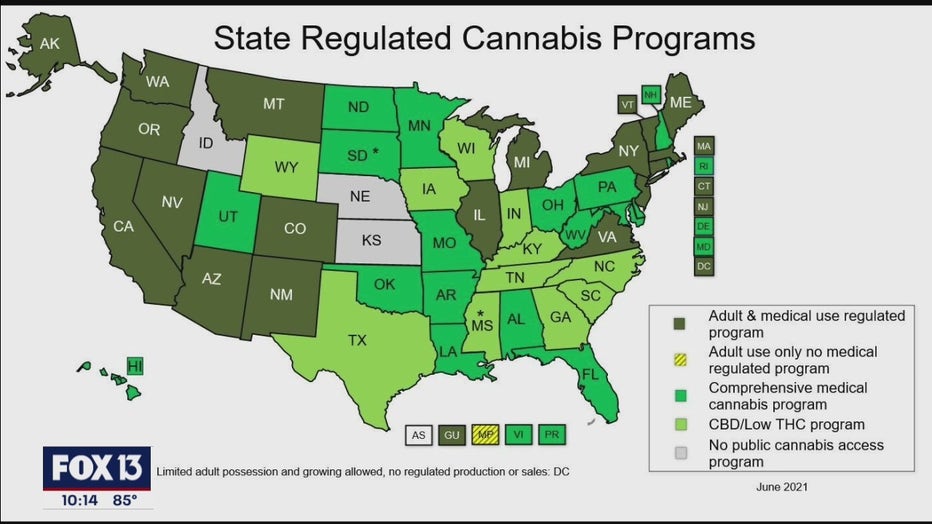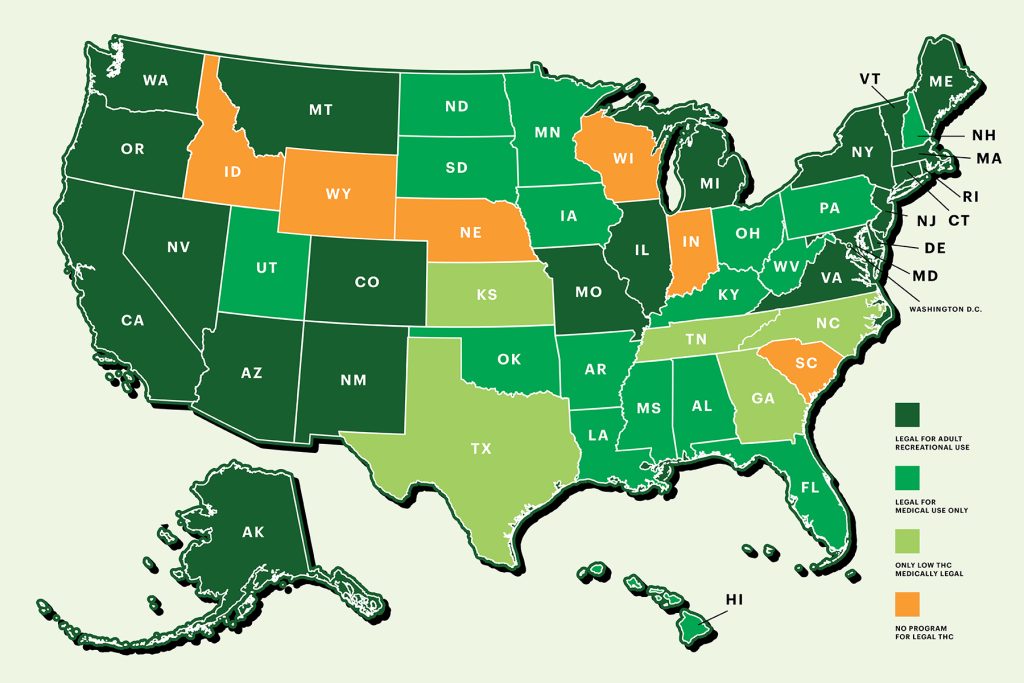If you’ve ever wondered about the legalization of recreational weed in Florida, you’re not alone. It’s a hot topic that sparks curiosity and debate among many. So, is recreational weed legal in Florida? Let’s dive in and explore the current status of marijuana laws in the Sunshine State.
Now, before we get into the nitty-gritty details, let’s set the stage. Florida is known for its beautiful beaches, vibrant nightlife, and lively entertainment scene. With its sunny weather and laid-back atmosphere, it’s no wonder people might wonder if recreational weed is on the menu. But, as with any state, the laws surrounding marijuana can be complex and ever-changing. So, let’s take a closer look at the current landscape and see if Florida is lighting up the green for recreational use.
Recreational weed is not legal in Florida. While the state has made progress with medical marijuana, which was legalized in 2016, recreational use remains illegal. Possession of marijuana in any form, including for personal use, is considered a crime in Florida. However, efforts to legalize recreational use have gained traction in recent years, and there is ongoing debate on the topic. It’s important to stay updated on the latest developments regarding marijuana laws in Florida.

Is Recreational Weed Legal in Florida?
Florida is known for its beautiful beaches, sunny weather, and vibrant culture. With its growing population and diverse demographics, many people wonder about the legal status of recreational weed in the state. In this article, we will explore the current laws and regulations surrounding recreational marijuana in Florida, as well as the potential benefits and drawbacks of legalization.
The Current Legal Status of Recreational Weed in Florida
Currently, recreational weed is not legal in Florida. The state has strict laws regarding the use, possession, and distribution of marijuana. Florida only allows the use of medical marijuana for qualified patients who have obtained a recommendation from a licensed physician. This means that individuals who do not have a valid medical condition and a prescription cannot legally use or possess marijuana for recreational purposes.
While the use of medical marijuana is legal in Florida, it is highly regulated. Patients must apply for a medical marijuana card and meet specific criteria to qualify. The Florida Department of Health oversees the medical marijuana program and regulates the production, distribution, and dispensing of medical marijuana products. It is important to note that even with a valid medical marijuana card, patients are only allowed to purchase and possess a limited amount of marijuana for personal use.
The Benefits of Legalizing Recreational Weed in Florida
1. Economic Boost: Legalizing recreational weed can have a significant economic impact on the state. It can create jobs in the cannabis industry, generate tax revenue, and stimulate local businesses.
2. Criminal Justice Reform: Legalization can help reduce the number of non-violent marijuana-related offenses and alleviate the burden on the criminal justice system. It can also free up law enforcement resources to focus on more serious crimes.
3. Access to Quality Products: Legalization can ensure that consumers have access to safe and regulated marijuana products. It can also promote quality control measures and testing to ensure the potency and purity of cannabis products.
4. Tourism and Hospitality: Florida is a popular tourist destination, and legalizing recreational weed could attract more visitors who are interested in cannabis tourism. This can boost the hospitality industry and contribute to the overall tourism economy.
The Drawbacks of Legalizing Recreational Weed in Florida
1. Public Health Concerns: Critics argue that legalizing recreational weed may lead to increased use, especially among young people. They express concerns about the potential negative health effects of marijuana use, such as impaired cognitive function and mental health issues.
2. Regulatory Challenges: Legalization would require the establishment of a comprehensive regulatory framework to ensure responsible use and prevent abuse. Implementing and enforcing these regulations can be complex and costly for the state.
3. Workplace Safety: Marijuana can impair cognitive function and motor skills, which can pose risks in certain workplaces, such as those involving heavy machinery or public safety. Employers may need to establish clear policies regarding marijuana use to maintain a safe work environment.
4. Federal Laws and Conflicts: Despite potential state legalization, marijuana remains illegal at the federal level. This creates conflicts in terms of enforcement and banking regulations, as financial institutions may be hesitant to work with cannabis-related businesses due to federal restrictions.
While the debate on the legalization of recreational weed continues, it is important to stay informed about the current laws and regulations in Florida. As attitudes towards marijuana evolve and more research is conducted, the legal landscape may change. Until then, it is crucial to abide by the existing laws and guidelines to avoid legal repercussions.
Key Takeaways: Is Recreational Weed Legal in Florida?
- Recreational weed is not legal in Florida.
- Florida only allows medical marijuana for qualified patients.
- Possession and use of recreational weed can result in legal consequences.
- Florida is known for its strict drug laws, so it is important to understand the regulations.
- If you are interested in using marijuana for recreational purposes, you should consider states where it is legal.
Frequently Asked Questions
Is it legal to use recreational weed in Florida?
As of now, recreational weed is not legal in Florida. The state only allows the use of medical marijuana for qualified patients who have obtained a medical marijuana card. The use, possession, and sale of recreational weed are still considered illegal and can result in legal consequences.
However, it’s important to note that there have been ongoing discussions and debates regarding the legalization of recreational marijuana in Florida. Some advocacy groups and lawmakers have been pushing for a change in the state’s marijuana laws. It remains to be seen if and when recreational weed will be legalized in Florida.
What are the current laws regarding recreational weed in Florida?
Under current Florida law, recreational weed is illegal. Possession of any amount of marijuana for recreational use is considered a misdemeanor offense, punishable by fines and potential jail time. The sale and distribution of recreational weed are also illegal and can result in more severe penalties, including felony charges.
It’s important to understand and abide by the current laws to avoid any legal trouble. If you are interested in using marijuana for recreational purposes, it is recommended to explore legal alternatives and consider obtaining a medical marijuana card if you qualify.
Are there any plans to legalize recreational weed in Florida?
There have been ongoing discussions and debates regarding the legalization of recreational marijuana in Florida. While no concrete plans have been put into motion as of now, there is growing support for the legalization of recreational weed in the state.
Advocacy groups, lawmakers, and even some residents are pushing for a change in Florida’s marijuana laws. However, it is important to note that the process of legalizing recreational marijuana is complex and requires careful consideration of various factors. It remains to be seen if and when recreational weed will be legalized in Florida.
What are the benefits of legalizing recreational weed in Florida?
There are several potential benefits of legalizing recreational weed in Florida. One of the main advantages is the economic impact it could have on the state. Legalizing recreational marijuana could create a new industry, leading to job creation and increased tax revenue.
Furthermore, legalization could also help regulate the market, ensuring that consumers have access to safe and high-quality products. It could also reduce the burden on law enforcement and the criminal justice system, allowing them to focus on more serious crimes.
What are the arguments against legalizing recreational weed in Florida?
Opponents of the legalization of recreational marijuana in Florida raise several concerns. One of the main arguments is the potential impact on public health and safety. Critics worry about the potential increase in drug addiction, impaired driving, and the negative effects of marijuana on mental health.
There are also concerns about the potential for marijuana to be a gateway drug, leading to the use of more dangerous substances. Additionally, opponents argue that legalizing recreational weed could send a message to young people that drug use is acceptable, potentially leading to an increase in underage marijuana use.

Recreational marijuana legalization getting closer to Florida ballot
Final Summary: Can You Blaze It in the Sunshine State?
Now that we’ve delved into the burning question of whether recreational weed is legal in Florida, let’s wrap it up with a final summary. While medical marijuana has made great strides in the state, the same cannot be said for recreational use. Unfortunately, at the time of writing, recreational weed is not yet legal in Florida. However, don’t let that put a damper on your Floridian dreams just yet. The landscape of cannabis laws is continually evolving, and who knows what the future may hold?
So, if you’re planning a trip to the Sunshine State and hoping to indulge in some recreational puffery, it’s essential to be aware of the current legal framework. Remember, always respect the laws and regulations of the state you’re in and abide by them. While you may not be able to legally light up a joint on a sandy Florida beach, there are still plenty of other activities and attractions to enjoy in this beautiful state. From the stunning beaches to the vibrant nightlife, Florida has something for everyone, whether you’re a cannabis enthusiast or not.
In conclusion, while recreational weed may not be legal in Florida, the conversation surrounding its decriminalization and legalization is ongoing. It’s crucial to stay informed about changes in legislation and support the efforts to reform cannabis laws responsibly. Who knows, one day the answer to the question “Is recreational weed legal in Florida?” might just be a resounding “Yes!” Until then, let’s appreciate the progress that has been made and continue advocating for a fair and sensible approach to cannabis legalization across the country.





